There’s a book out about Rin Tin Tin, the old dog-star of Hollywood, by that stuck-up New Yorker hack Susan Orlean. She’s best-known for writing the bestseller The Orchid Thief, which got adapted by lofty screenwriter Charlie Kaufman into a smug self-reflexive film called Adaptation starring Nicolas Cage as Charlie Kaufman the screenwriter trying to adapt The Orchid Thief for film, which just shows you how up its own ass this movie is. And guess who plays Susan Orlean in it? Meryl Streep. Yeah, the snootiest most high-culture over-Oscared WASPy revered actress alive. Amazing how those kind of “quality” people still get together, as if they all belonged to the same private club where they meet regularly for cocktails and lucrative business deals and deciding who will play whom in the film.
It’s very unfortunate that Susan Orlean should write a book about Rin Tin Tin, because I’m actually interested in reading a book about Rin Tin Tin. So I read hers. Battled my way through it, actually, against the tremendous obstacle of the author herself. There’s an awful lot of Susan Orlean messing up Rin Tin Tin: The Life and the Legend. Every time you settle in to read about some charged moment in the life of an interesting German Shepherd, you find yourself swamped by the high-toned musings of Susan Orlean again.
It’s too bad about New Journalism, which seemed like such a good idea at the time. You actually want to read about a thing and instead you’ve got to read about the irritating super-literary schmo who found out about the thing, and all the trouble the schmo went to, and how the schmo felt about it. Somebody really ought to clean up New Journalism, at least enforce a No-Schmoes policy.
Anyway, New Journalist Susan Orlean narrates how she learned about Rin Tin Tin by talking to many exotically primitive, non-quality people along the way, and by doing amusingly grubby things like rooting through their public storage units. But such excursions are well worth it to her, because that way Susan Orlean finds out more about how fascinating Susan Orlean is:
For me, the story of Rin Tin Tin let me cast a line into the pool of my childhood memories, an undertaking that felt more urgent every day I walked further away from the edge of that pool. I began the story of Rin Tin Tin soon after my father died and my son had been born; the idea of continuity was suddenly very real to me. Reeling Rin Tin Tin into the present would not only revive his story but also perhaps clarify my own—the story of who I am and how I happened to become the person I seem to be.
Orlean’s favorite tone is that of soft profundity, the kind that only the privileged can afford. “Leisure class” breathes through every syllable. That fishing metaphor’s a beaut, isn’t it? Casting a line into the pool of childhood memory, reeling in Rin Tin Tin. So evocative of an agrarian past, but not the dirty starved hard-working one, no, the gentler more contemplative never-never world of Walden Pond, The Andy Griffith Show, and blonde airbrushed Americanized water-walking Jesus H. Christ telling disciples to be fishers of men. It’s so perfectly trite and phony there’s a kind of sick genius in it. Of course, Susan Orlean probably has a pond on her 55-acre property “where she lives with her family and her animals in Columbus County, New York,” as the bio-blurb informs us. And I wouldn’t put it past her to fish in it, either, in a wistful, bemused way that she’ll write about later for The New Yorker.
All this is rotten, because Rin Tin Tin was a beautiful animal with many fascinating qualities and an epic life story. When she can stop writing about herself for awhile and focus on the dog, Orlean gets some good stuff across about him. He and his litter-mates were rescued from a bombed-out cellar in World War I France by an odd, lonely, dog-loving soldier named Lee Duncan, who already knew about the then-rare-in-the-US breed called the German Shepherd. He named his puppy for a little French toy that was popular at the time, trained him to do astonishing things, and took him out to Hollywood where, against all odds, the dog became a top star of the 1920s. Such a top star, his box-office earnings regularly bailed out Warner Brothers studio, where he was referred to as “the mortgage-lifter.” His celebrity made German Shepherds the most popular dog in the USA for many years.
The charismatic dog had a very dark face, which made him difficult for cinematographers to light; later Rin Tin Tins, some related to the original German Shepherd star, some not, were more classically handsome representatives of the breed, and always had more tan markings. But none ever matched the remarkable combination of star qualities that the first Rin Tin Tin had. After the dog’s death in 1932, Lee Duncan’s life was a sad one; he was forever trying and failing to recapture the perfect relationship he had with the perfect dog-star, and then resigning himself to living as the keeper of “the Memory Room” full of Rin Tin Tin memorabilia.
Rin Tin Tin the First was athletic, with an amazing ability to leap walls up to twelve-feet high, which was obviously cinematic gold. He had a matchless range of expressions (Duncan trained him to do a lot of them) and, in repose, an admirably grave demeanor that inspires some typical Orlean oversell:
[He had] the resigned and solemn air of an existentialist. In his most popular portrait—shot in the 1920s, copied by the tens of thousands, and signed “Most Faithfully, Rin Tin Tin” in Lee’s spiky script—his jaw is set and his eyes are cast downwards, as if he was thinking about something very sad. Even when photographed doing something playful like, say waterskiing or sunbathing or riding a horse or getting a manicure or snowshoeing with starlets or drinking a glass of milk with a group of children who were also drinking milk, he had a way of looking pensive, preoccupied, as if there were a weight on his soul.
Well, it’s a lovely photo of Rinty, all right, let’s just say that.
His typical character in movies was that of a Jack London-esque dog torn between his wild side and his tame side, and his dark face could look nicely atavistic when he was running with a wolf pack but trying to decide if he ought to slip off and rescue some rare worthy person in trouble. The description of these dog movies in which the dogs are the real heroes with moral dilemmas sound pretty good, I have to say. Silent film fostered the possibilities of animal-acted drama. A dog’s face is every bit as interesting to study as a human’s, after all—more interesting, actually—as many an upstaged human actor knows to his sorrow, animals will act you off the screen every time.
Later on, when Rin Tin Tin III was starring on a hit TV show, the dog character wasn’t nearly so central. He mainly hung around waiting to save some hapless idiot, without seeming to ponder whether such a lifestyle might be an ignoble one for a proud wolf-descendant. The “Lassie, come quick, Timmy’s trapped in the well” narrative was the order of the day.
The Talkies ended Rin Tin Tin’s career as a huge movie star. After Warner Brothers made The Jazz Singer and sound film became the only game in town, Jack Warner sent a cruel memo to Lee Duncan reminding him that “dogs don’t talk” and therefore they wouldn’t be renewing Rin Tin Tin’s contract. It makes one happy to think that Rin Tin Tin once bit Jack Warner; according to legend, he bit most of the film types he worked with, or at least threw himself into fight scenes with such enthusiasm he was a menace to human co-stars. Atta boy, Rinty! Good dog!
(Reminds me: I was on a film shoot once, working with a novice director who was a real rat-bastard. The scene involved a German Shepherd and the director wasn’t pleased with the dog’s performance and didn’t know anything about dogs, or directing, or anything. He decided to “adjust the dog’s position” without asking the trainer, strode up and pulled the dog’s front legs forward. The dog growled deeply in his face, the bastard director leaped back as if shot, and the entire crew lit up with joyful anticipation. But the dog was a disciplined dog: he didn’t proceed to rip the director’s throat out, and the rest of the rotten movie actually got made and released. It was a real shame.)
Susan Orlean tours through a lot of related subject matter surrounding the “life and legend” of Rin Tin Tin, and some of it is pretty interesting. Stuff about the breeding and popularization of German Shepherds, the rise of the concept of the “companion animal,” other dog stars like Rover and Strongheart and Lassie, that kind of thing. (My favorite bit of info was the fact that there was a film genre known as a “snow” in silent era Hollywood, when audiences were fascinated by the idea of the “frozen North.” Only they didn’t call it a “Northern.” So somebody might say, “We’re going up to Canada to shoot a ‘snow.’”)
Orlean seems to be good at research. If she’d stay off her own feelings and quests for “meaning” in everything and rein in the bathetic prose style…which she won’t. Get a load of this doozy, which occurs after Susan Orlean stages a big scene of “meaning” for herself by visiting a World War I cemetery:
As I drove away in the dusky light, I kept seeing the tailored rows of graves, those tiny repositories of stories that are hardly remembered, all those sad and broken boys resting in the velvet lawn of St. Mihiel, forever. Almost one hundred years of resting there, enough time to be forgotten, the lives that continued after theirs ended having now filled up the space that opened up when they died, so their absence now has been lacquered over, smoothed out, almost invisible.
What lasts? What lingers? What is snagged by the brambles of time, and what slips through and disappears? What leaves only a little dent in the world, the soft sunken green grave, the scribble on a scrap of paper, the memory that is bleached by time and then vanishes bit by bit each day?
“What is snagged by the brambles of time?”! It goes drooling on like that, the whipping-up of one’s own emotions into a sentimental froth that fourteen-year-olds indulge in, fourteen-year-olds whose lives have been pretty cushy, anyway. It’s interesting that in telling the story of Rin Tin Tin, Orlean has to describe genuinely ghastly things happening, and some she chooses to weep and pontificate over extensively, while others she reports with crisp brevity. After describing the widespread use of dogs in wartime military service during World War I, for example, and relating a number of anecdotes about the indispensability and incredible heroism of the dogs in combat and all that, she rids us of the war dogs thusly: “The French military destroyed the majority of its dogs as the war skidded to a close. The British, German, Italian, and Russian military likely did the same.”
Suddenly the drive to do intensive research deserts her, as well as the impulse to drivel over the unremembered dead. Lee Duncan managed to save Rin Tin Tin from the wholesale slaughter—he’s the dog that we’re waxing lugubrious about here—so, moving on. Interesting mix of the sopping-wet and the suddenly dry, the mushy-soft and unpleasantly hard, in Susan Orlean’s prose. In other words, a nasty rich bitch peeks out occasionally through all that whipped-cream wordplay.
Still, the dog himself is great, and few film stars ever get a worthy biographer. If you look at it that way, it’s not so bad.
Read more: Adaptation, Charlie Kaufman, dogs, film stars, Meryl Streep, Rin Tin Tin, Susan Orlean, The Orchid Thief, World War I, Eileen Jones, Books


Got something to say to us? Then send us a letter.
Want us to stick around? Donate to The eXiled.
Twitter twerps can follow us at twitter.com/exiledonline




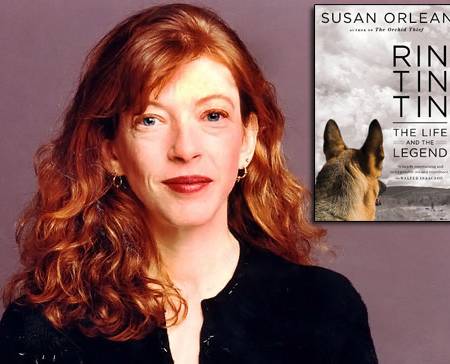
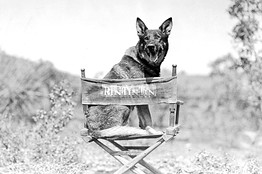
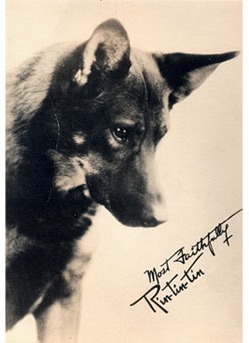
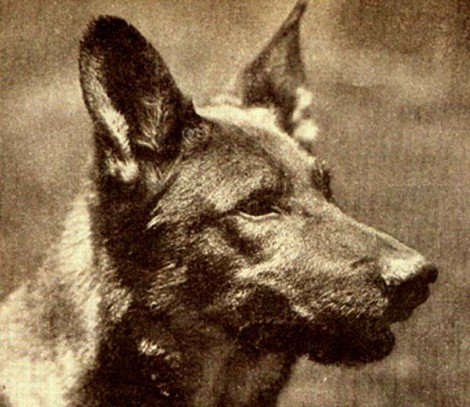
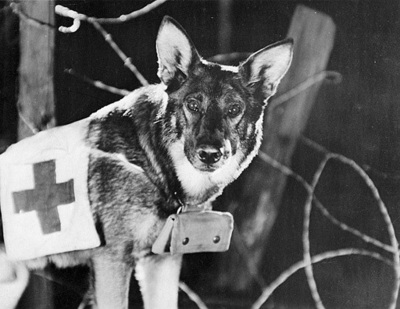

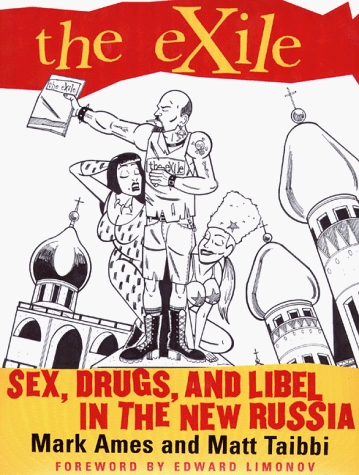









54 Comments
Add your own1. cassandra | October 28th, 2011 at 2:36 pm
dogs are a fascist animal. who’s the go-to for soldiers terrorizing brown guys in gitmo, for cops beating down blacks, for eunuch airport dicks searching for drugs to better rob some people of their fleeting happiness. who demands pig-like authority and dominance from their owner?
that said, rin tin tin is handsome for a dog and i feel bad for him that he had the misfortune to be a dog. sorry, puppy, it’s not your fault.
2. franc black | October 28th, 2011 at 2:50 pm
“Eileen”,
Did you photoshop that pic to make her look jaundiced and a bit ‘slapped about the face’?
Nasty if you did. Nasty if you didn’t.
3. Spacey | October 28th, 2011 at 2:52 pm
dogs are as much a fascist animal as horses are genocideists. who’s the go-to-animal when people are buried inside of buildings, for guiding blind people around society, for having instincts that detect heart attacks and seizures in humans, humans use animals as tools, like it or not, that is how they have been used and will continue to be used, like any tools they can, have, and will be misused.
that being said, cats are the ultimate anti-establishment badasses.
4. CensusLouie | October 28th, 2011 at 3:45 pm
I’m really not sure how the word “smug” could be used at all to describe Adaptation. It’s one of the most self-degrading flicks of the decade, the exact polar opposite of smug. Even more self-degrading than your average Woodie Allen movie, and I don’t see anyone calling Woodie smug.
This semester’s final paper will be a 10 page thesis on how someone can manage to dredge up praise for the 4th Pirates of the Caribbean movie while having nothing but scorn for the funny and brilliant Adaptation.
5. cassandra | October 28th, 2011 at 3:56 pm
look i just hate dogs because of the dominance thing
also horses are mean creepy motherfuckers
6. Bradford C. | October 28th, 2011 at 3:59 pm
Apparently Cassandra has not heard of Loukanikos, Greek Protest Dog
http://www.youtube.com/watch?v=Yax-adLCTgg
7. Martin Finnucane | October 28th, 2011 at 4:36 pm
Dogs have the capacity for bravery. Cats carry hideous pathogens that infest human and rodent brains. I’ll take your ‘fascist’ dog.
8. Duarte Guerreiro | October 28th, 2011 at 5:04 pm
Great, just 3 comments before derailment into a cats-vs-dogs thread. Requesting a carpet bombing.
9. DtD | October 28th, 2011 at 5:31 pm
Cats are the fucking serial killers of the domesticated animal world. Having one of those things around a properly functioning permaculture style homestead is like planting land mines in your own corn field.
10. kallipugos | October 28th, 2011 at 6:49 pm
Well Susan Orlean and Meryl Streep can kma, but Nicholas Cage deserves a little respect. Remember that line from ‘Bad Lieutenant’, “Everything I take is prescription. Except the heroin.” The man can bring the crazy, we need actors like that.
11. pearl fiddler mcqueen | October 28th, 2011 at 8:47 pm
“”What is snagged by the brambles of time?”” Her pussy.
12. John Drinkwater | October 28th, 2011 at 8:57 pm
The first half of this review, with the attack on Susan Orlean, made me laugh several times, so thanks for that. But I couldn’t bring myself to read about Rin Tin Tin, a dog I have no knowledge of and, sadly, no interest in either. Though I do think it’s funny that you’re actually writing about Rin Tin Tin. Are you too broke to go see The Rum Diary? Yeah, me too.
13. Alexius | October 28th, 2011 at 9:01 pm
How the fuck can an animal be fascist?
14. Carolyn | October 28th, 2011 at 10:02 pm
I love you, Eileen, and I’ll still love you just as much even if you’re John Dolan. I just wanna believe you’re a woman because I want to think there’s a woman out there who’s as smart as you.
(Maybe you’re Katherine Dolan…?)
15. Anarchy Wolf | October 28th, 2011 at 11:12 pm
Cassandra, you sound like you have had bad experiences with animals, and that makes me sad, because it means your life is probably a void of despair and desperation.
16. Cum | October 29th, 2011 at 1:16 am
Hamsters are the most anarchist animal. Trust me, Honeyboo did not like her cage. She was always biting it, just tying to break free. Put her in a ball, and she’d be out in two minutes, escaping to go live in the walls for days at a time. One time she spit up and pooped on my lap at the same time, then lined herself up to piss right in the exact center of my lap. Sid Vicious got his name from a hamster. You should write an article about hamtaro, the japanese cartoon hamster. Or maybe one about the fly who played the fly in The Fly.
17. gc | October 29th, 2011 at 1:39 am
“Even more self-degrading than your average Woodie Allen movie, and I don’t see anyone calling Woodie smug.”
Look harder.
Self-degredation can be one of the smuggest things in the world. “Look at how comfortable I am with my flaws! Look at how honest I am!”
Woody Allen is a sometimes great filmmaker and Charlie Kaufman – well, I suppose his mother loves him – but don’t let them sucker you! Don’t do it!
18. gc | October 29th, 2011 at 1:42 am
“the story of who I am and how I happened to become the person I seem to be.”
Oh Jesus Christ, I get a tight feeling in my throat just reading that. (“…the person I seem to be”? Fuck, why stop there? How about “the person I seem to believe I seem to be”.)
“Soft profundity” is the PERFECT phrase for this, to be sure.
19. Ben | October 29th, 2011 at 3:57 am
cassandra, it turns out that the idea that dogs have a “dominance hierarchy” and need to be dominated to behave themselves is now discredited (although still promulgated by TV “experts”). It was all based on the idea that wolves have a dominance hierarchy, and well, dogs are kind of like wolves (ignoring 100,000 years of selective breeding for amiability).
But it turns out the studies on captive wolves that seemed to show packs being dominated by an alpha wolf didn’t reflect what really happens in the wild. Real wolf packs are family units, and the apparently “dominant” animals are simply the parents.
When they actually test all the theories of dog training that rely on asserting dominance, they don’t make dogs any better behaved, and in fact they risk confusing the dog.
It turns out the animal obsessed with fascist dominance hierarchies was MANKIND ALL ALONG.
My source for this is In Defence of Dogs by John Bradshaw, a proper dog psychology researcher who explains all the experiments which support what he’s saying, so I guess he’s probably right.
20. Timmy | October 29th, 2011 at 8:01 am
Mr Bad, you should understand words before you use them – you have abused
Mr Ames and the english language. A pederast is one who sexually prefers adolescent and or teenage *boys*.
I note that in The Big Lebowski, Walter uses it incorrectly too, as Jesus exposing himself to an eight year old indicates pedophilia rather than pederasty,
21. Ashton | October 29th, 2011 at 8:53 am
You know what? My first reaction on seeing her photo was, “damn, this woman is hot and I totally want to have sex with her.” I don’t care what nonsense she may be guilty of in the rest of the article, I’d still like to sleep with her.
22. Gustavo Arellano | October 29th, 2011 at 9:45 am
Leave it to the Exiled to trash one of the most-admired journalists in the U.S.—and that’s why I love the Exiled! Now, if only one of you could take on Tad Friend, your trifecta of bashing overrated New Yorker writers (Malcolm Gladwell, you guys already did) will be complete…
23. jack | October 29th, 2011 at 10:19 am
I had an awesome hamster, Baroness, named after the Red Baron. Smart, lucky, adventurous, she lived a long, successful hamster life.
All my other hamsters sucked, however.
24. Yuddham | October 29th, 2011 at 10:19 am
Obviously most of the commenters here do not know how to appreciate an intelligent animal.
25. helplesscase | October 29th, 2011 at 12:58 pm
Eileen: Beautiful animal. I really liked your characterization of “soft profundity.”
Ben: “It turns out the animal obsessed with fascist dominance hierarchies was MANKIND ALL ALONG.” God, that’s a great sentence.
Ashton: I think that’s the plot of Adaptation.
26. CensusLouie | October 29th, 2011 at 2:04 pm
#17
Did I see a totally different Adaptation than everyone else? If you want to see an actual “smug about flaws/quirks”, I kindly direct you towards Juno or any Miranda July movie.
Adaptation was none of this. Nick Cage’s character was shunned (not in a way to be proud of) and unloved. His quest to be original and faithful turned up nothing but blank pages and it’s only when he finally gives in to the easy out does he “accomplish” anything and move on to an empty life.
This is the EXACT same path John Turturro’s character traveled in Barton Fink. I think the only reason anyone calls Adaptation “smug” is because the main character is an obvious self-insertion of the author. Would people say Barton Fink was smug if John Turturro’s character was named Joel Coen? You might as well call half the works of Vonnegut smug.
27. CensusLouie | October 29th, 2011 at 2:16 pm
and this is coming from someone who otherwise isn’t a Charlie Kaufman fan. I thought Being John Malcovich was massively overrated and that Eternal Sunshine only seems to resonate with people not capable of weeding out total psychos for relationships.
28. Homer Erotic | October 29th, 2011 at 3:31 pm
Thanks for using “lugubrious”. It’s one of my favorite fifty-dollar words! 😀
29. Aston | October 29th, 2011 at 4:43 pm
You know what? My first reaction on seeing her photo was, “damn, this dog is hot and I totally want to have sex with her.” I don’t care what nonsense she may be guilty of in the rest of the article, I’d still like to sleep with her.
30. iCONOCLAST | October 29th, 2011 at 8:37 pm
@15
“Cassandra, you sound like you have had bad experiences with animals, and that makes me sad, because it means your life is probably void of despair and desperation.”
Fix’d.
31. Ronin | October 29th, 2011 at 9:38 pm
Take a closer look. Crazy eyes. Although I have had worse,
32. matt | October 29th, 2011 at 10:32 pm
CensusLouie
and might I add to the “This semester’s final paper will be a 10 page thesis on how someone can manage to dredge up praise for the 4th Pirates of the Caribbean movie while having nothing but scorn for the funny and brilliant Adaptation.”
…and how one can possibly have it out for Meryl Streep.
Sure she’s overrated, but the woman makes bearable almost any piece of shit movie she’s in.
God I hope the exiled isn’t going the way of Counterpunch and becoming contrarian for the sake of contrarianism.
33. my talkative ringpiece | October 29th, 2011 at 10:50 pm
Who was there to eat that piece of French toast you accidentally cooked a huge ol’ cockroach in? Who was there to lick his balls with disgusting sounds, then go around catching – or trying to catch – flies in his big flapping mouth? Who’d been apparently been put on this Earth to remind you there’s at least one creature dumber, smellier, and more useless than you? Who never had the mean bone in his body – or the work-ethic – to bite the phone man? Why it was Max, the anti-Rin-Tin-Tin. Looked just like Rinty except for some reason his ears didn’t stand up that well.
34. gc | October 30th, 2011 at 2:42 am
@26
[i]”Adaptation was none of this. Nick Cage’s character was shunned (not in a way to be proud of) and unloved. His quest to be original and faithful turned up nothing but blank pages and it’s only when he finally gives in to the easy out does he ‘accomplish’ anything and move on to an empty life.”[/i]
None of this disagrees with what I wrote.
[i]”This is the EXACT same path John Turturro’s character traveled in Barton Fink. I think the only reason anyone calls Adaptation ‘smug’ is because the main character is an obvious self-insertion of the author. Would people say Barton Fink was smug if John Turturro’s character was named Joel Coen? You might as well call half the works of Vonnegut smug.”[/i]
Half of Vonnegut smug? I call [i]all[/i] of Vonnegut smug.
Since we’re on the subject, another plea to anybody reading this: Do not mistake Vonnegut for your friend! Vonnegut is one of the Ron Pauls of literature (the detested-of-John-Dolan George Orwell is another); seems to be on the side of good, until you look closer. Though sometimes you don’t even have to look all that closely; he almost totally lets the facade fall in “Harrison Bergeron” – which is essentially different from Ayn Rand only in that Vonnegut is a funnier and more articulate writer, and that he tries to cover his ass at the last second by making Harrison an imperious jerk, while Rand is unapologetic about her superman-worship.
As for Barton Fink; the difference between Adaptation and Barton Fink is the sense of outrage. Adaptation expects nothing better of humanity; we’re all supposed to join in and laugh in jolly despair at our human foibles. Barton Fink does expect better; Barton, and humanity in general, have failed to live up to the Coens’ standards for what human beings should be, and so the have to suffer.
And it wouldn’t matter if Barton were named “Joel Coen”. He still wouldn’t be a self insertion, because the Coens don’t think they’re just another couple of bumbling schmoes like the rest of us. The Coens think they’re better than you.
Admittedly, it comes down to almost the same thing. Kaufman accepts what’s wrong with the world; the Coens condemn what’s wrong with the world but don’t have any ideas of what to do about it. But at least they make their despair uncomfortable.
35. Trevor | October 30th, 2011 at 7:51 am
The Bad Old World is indeed still alive…
And folks, Jones is NOT Dolan. There’s distinct differences between their writing and Jones was posting to AlterNet before the eXiled picked her up.
36. Zoner | October 30th, 2011 at 8:06 am
Susan Orleans is holding up pretty well, my compliments to her plastic surgeon.
37. franc black | October 30th, 2011 at 8:42 am
Paranormal Activity 3
Get stoned (and/or inebriated) and go see it at a theatre surrounded by screaming teenagers. Classic.
38. Flatulissimo | October 30th, 2011 at 11:33 am
@35 – I’m getting tired of people constantly saying Jones = Dolan, too.
C’mon, would anyone seriously think Dolan has ever worked on a film shoot?
39. Ashton | October 30th, 2011 at 5:12 pm
Am I the only one that thinks she’s really hot? She, sure kinda writes like an uppah-clahss debutante writing for a NYC cafe crowd but I would totally bang the daylights out of her.
40. my talkative ringpiece | October 30th, 2011 at 8:26 pm
#34 are you sure Kurt Vonnegut’s character can be summed up by one quick-sketch story written when he was a fairly new writer and cranking out words for the pulps as quickly as he could to feed his children?
How about this:
“Thus did a handful of rapacious citizens come to control all that was worth controlling in America. Thus was the savage and stupid and entirely inappropriate and unnecessary and humorless American class system created. Honest, industrious, peaceful citizens were classed as bloodsuckers, if they asked to be paid a living wage. And they saw that praise was reserved henceforth for those who devised means of getting paid enormously for committing crimes against which no laws had been passed. Thus the American dream turned belly up, turned green, bobbed to the scummy surface of cupidity unlimited, filled with gas, went bang in the noonday sun.”
– Kurt Vonnegut, God Bless You Mr. Rosewater
I don’t think he’s that easy to sum up, and I think during his lifetime he grew up. How many of us can say that?
41. Ashton | October 30th, 2011 at 10:11 pm
Last comments on this article….
Sorry to Ms. Orlean if I phrased my feelings to her in an untowards her manner.
Exiled, whatever differences you may have with her she’s too pretty to be mad at. Next time you wish to attack a woman please attack that ugly-ass bitch Ann Coulter or that obnoxious, lying cunt Michelle Malkin…. or any other right-wing ho on Fox News. Thank you.
42. pop | October 30th, 2011 at 10:37 pm
Hell yes. Best hatchet job for a long time. Nice one.
Pearl fiddler mcqueen — Best comment ever! You also win this year’s Arthur Pewty Award for Most Outstanding Contribution to Bathos.
Also… yeah, that’s a great photo. But even though dear old Rinty was French, he doesn’t have an existentialist weight upon his soul. He’s a fuckin dog FFS. Dogs look down like that for the same reason this kitteh is looking down. http://www.flickr.com/photos/61747759@N04/6218840449/in/photostream/
43. gc | October 30th, 2011 at 11:20 pm
@40.
Okay, fine, holding the mature Vonnegut responsible for “Harrison Bergeron” is unfair. Granted.
The rest of what I wrote stands, though. Vonnegut doesn’t fight; doesn’t even condemn; he just registers bemusedly mournful resignation. This is the man where one of his two or three best books has the refrain “So it goes.”
44. My Dick | October 31st, 2011 at 2:30 am
Every one of you faggots who wrote anything about animals having political attributes deserves to die in a fucking fire.
45. exploited times | October 31st, 2011 at 5:02 pm
What a comment thread, the devolution of an article and its readership. Eileen, when will you review The Crying Game? But seriously, Chris Cooper does shred in Adaptation, which this piece has nothing to do with.
Thanks
46. exploited times | October 31st, 2011 at 5:10 pm
@ matt 32,
I don’t know about contrarian but Thomas Naylor takes a nice cut into the same New Yorker snobbery in CP this week..good shit
47. rick | October 31st, 2011 at 11:16 pm
Susan Orlean is palpably talented in “The Orchid Thief.” It’s kind of overwhelming, and I hate “The New Yorker” whenever I feel intellectually responsible doing so. Somewhat distasteful.
48. 6626 | November 1st, 2011 at 7:40 pm
@44
you seem like you are upset, would you like a juice
also all you people dissing on vonnegut, that is such a hipster thing to do~
49. Sir Hendersson | November 2nd, 2011 at 4:37 pm
The reason dark faces on dogs and humans did not do well in early cinematography was due to a choice in film. See, in the early days they used film that captured nuances in dark faces well but also made us white people as red in the face as an irishmen after his ‘lunch’. Thankfully, this was solved with a change in film.
50. gc | November 2nd, 2011 at 6:06 pm
@48
Saying “That’s such a hipster thing to do” is such a hipster thing to do.
51. Toba | November 3rd, 2011 at 3:12 pm
Dammit! this is the kind of thing that pisses me off!!! Couldn’t Duncan at least have a goddamn impression of Rin’s paw neatly placed beneath that signature ? Jeez.
52. rin tin tin | November 22nd, 2011 at 8:15 pm
cassandra, get raped by a pack of dogs.
53. bobalooo | November 25th, 2011 at 8:41 am
She was on Colbert and they never showed the 12 foot wall jump clip! Such a grest opportunity wasted.
We love you Rin Tin Tin!
54. jyp | September 10th, 2012 at 11:56 am
“the resigned and solemn air of an existentialist.”
Hah! I’m an existentialist and my air is neither resigned nor solemn. Mr Sartre was an existentialist. His was neither resigned nor solemn either. In fact, he was a little prick. The squinting little five foot runt was ever shagging his female students and happily not cringing about it at all. An annoying little Marxist he was too. Everything we would hate: tiny, nasty, squinty, communist, French, novelist, philosopher, student-shagger.
But not resigned. Nor solemn.
Leave a Comment
(Open to all. Comments can and will be censored at whim and without warning.)
Subscribe to the comments via RSS Feed